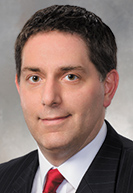Subscriber Benefit
As a subscriber you can listen to articles at work, in the car, or while you work out. Subscribe NowThe Indiana Court of Appeals occasionally reverses a trial court decision, and when it does it can feel like a big win for the attorneys who launched the appeal.
It certainly felt that way for a recent graduate of the Indiana University Robert H. McKinney School of Law.
Megan Hill joined the law school’s appellate clinic the fall semester of her third year.
There were six students in the class. Each student gets a separate case to work on, but everyone as a whole discusses the cases and reads through the transcripts.
Hill managed to land a case that resulted in the reversal of a Marion Superior Court ruling that deemed an Indianapolis high school student as a juvenile delinquent.
“It was pretty collaborative. It was a really good experience because, while you obviously weren’t responsible for fully writing everyone’s brief, like you got to follow the process of everyone else’s cases as well and learn about the issues that they were appealing on to,” Hill said.
Hill joined the clinic after participating in moot court the previous year and was looking to get experience in appellate work.

She worked on a juvenile case with along with Professor Joel Schumm. They submitted briefs in the fall semester and then in the spring semester the opinion was handed down.
In an April memorandum decision, the appellate court reversed juvenile K.F.’s adjudication concluding there wasn’t sufficient evidence.
Hill’s client, K.F. was adjudicated as a juvenile delinquent for intimidation after he made a statement in a busy school hallway at Tindley Accelerated School in reaction to the alleged stabbing of his friend.
He threatened to go get a gun but he didn’t threaten anyone in particular.
The appellate court ruled that while K.F.’s actions were disturbing, they did not amount to intimidation.
“While we conclude the State failed to carry its burden of establishing that K.F.’s conduct amounted to intimidation of the school’s faculty and staff in this instance, we are mindful of the devastation that school shootings have caused across our nation over the years, and we do not condone this type of behavior,” Senior Judge John Baker wrote in the opinion.
The opinion was certified on June 12.
“It was great news to get a reversal, especially when it’s … more common than not to not get a reversal,” Hill said. “It was really exciting, and it was definitely a relief. And I’m sure it was probably a relief for him, too.”
Schumm said Hill now has experience with juvenile delinquency that most students and lawyers don’t have.
“Most students don’t have, most lawyers don’t have background in like juvenile delinquency cases, so those appeals sometimes present different challenges. But she did a really good, excellent job on the brief,” Schumm said.
Hill will be working as an associate at Lewis Wagner and focusing her practice on medical malpractice and employment law.
She said having the appellate experience has given her a good foundation for her practice outside of law school.
Genesis of the clinic
When Schumm first started teaching at the law school in 2001, he had a contract to do appeals for the Marion County Public Defender’s Office.
“I thought it was important that in addition to teaching that I was practicing and still involved, and sort of knowing what was going on in the real world for lawyers, especially teaching a class like legal writing that’s really practical,” Schumm said.
In 2008 he started the clinic because he felt like students should be involved too.
“It’s been really a highlight of all the classes I teach,” Schumm said.
He added that by having the students looking at transcripts, it provides a new perspective that he hadn’t thought of before.
For example, when reading through the transcripts he’ll immediately rule out what he cannot raise on appeal.
“We don’t go in trying to rule things out and everybody comes to each of the cases with an open- minded perspective, and that’s, I think, really good in terms of generating ideas of what to raise,” Schumm said.
The clinic takes cases from the Marion County Public Defender Agency and sometimes other counties in Indiana.
Schumm said he looks for a variety of cases for the students to work on.

Suzanne St. John, an adjunct professor at the law school, was part of the clinic when she was a student and now co-teaches with Schumm.
“I think the clinic was the most valuable law school experience that I had, just because it was doing real work. It’s not theoretical, and you get feedback, not only from your client and the professor, but also from the court, because you get a written decision in every case,” St. John said.
She added that the clinic helps law students build confidence and run the gamut of the work lawyers do.
“There’s some complex legal issues to think your way through, and it’s sort of intellectually challenging that way, but it kind of gives you a taste of everything you do as a lawyer, communicating with your client, writing motions, writing briefs, doing an oral argument,” St. John said.
The majority of cases on appeal don’t have oral argument and instead rely on submitted briefs but occasionally the law student will get to appear before the appellate panel to argue on the behalf of their client.
St. John said in 2022, two of the students saw reversals in their cases.
“I told them that this is not the traditional experience when you’re on appeal, just because statistically, I think when you’re up on appeal, you have maybe a 15% chance of getting anything, any kind of relief. And so it’s not uncommon for the students to lose,” St. John said.
She also noted that back in January a student had a reversal in a double jeopardy case in which the state conceded.
“It wasn’t a surprise that we won, but it was kind of a surprise that the state conceded,” St. John said.•
Please enable JavaScript to view this content.

